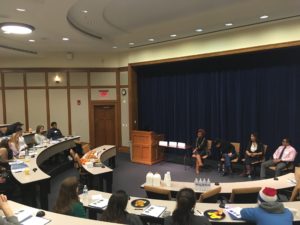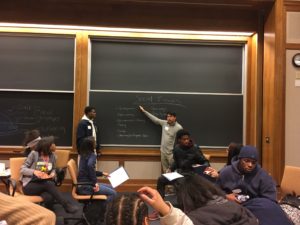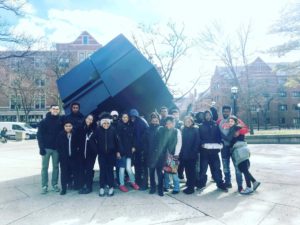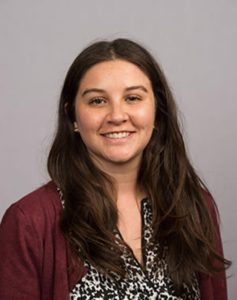Guest post by Carmen Ye, 1st year MPP student:
On Friday, March 10, the Ford School welcomed a new group of students. Twenty-nine high school students from the Detroit Leadership Academy (DLA) and Washtenaw International (WIHI) joined Ford for a day at the annual Public Policy Connects (PPC) conference. Organized by the Association of Public Policy for Learning and Education (APPLE), PPC aims to educate high school students about the field of public policy and careers in public policy, and challenge them to think about issues in their communities in a policy-oriented way. This year’s PPC organizers were Kate Naranjo, Hannah Bauman, and me.
 The day started with a panel asking “What Is Public Policy?”, featuring Susan Guindi, the Director of Student and Academic Services; Talha Mirza, a junior and Ford B.A. student; and Charisse Wilkins, a first-year MPP and MBA student. Perhaps the most exciting thing about this session was not the diversity in the panelists’ experiences, interests, and backgrounds, but that Talha himself had been a PPC participant when he had attended WIHI. It was truly full circle to see Talha speaking to students from a high school he had graduated from several years ago.
The day started with a panel asking “What Is Public Policy?”, featuring Susan Guindi, the Director of Student and Academic Services; Talha Mirza, a junior and Ford B.A. student; and Charisse Wilkins, a first-year MPP and MBA student. Perhaps the most exciting thing about this session was not the diversity in the panelists’ experiences, interests, and backgrounds, but that Talha himself had been a PPC participant when he had attended WIHI. It was truly full circle to see Talha speaking to students from a high school he had graduated from several years ago.
During the Q&A portion of the panel, the students asked thoughtful and engaged questions. One senior, who knew she wanted to study engineering in college, asked, “How can I still be involved in public policy as an engineer?” I thought of something I had heard during my time with the Public Policy and International Affairs (PPIA) program, “There are few roads that do not lead to public policy.” And Susan conveyed this in her response, emphasizing that engineering is not isolated from things like energy and environmental policy, and to volunteer for causes she cares about.
The remaining sessions of PPC involved small group break-outs. Starting with a community scan, facilitators asked students what issues they cared about in their community. They  identified topics ranging from lack of mentorship to police brutality to inequality between school districts. One discussed the systemic discrimination in the incarceration system, and highlighted sentencing differences between crack and powder cocaine as a factor contributing to oppression. Listening to them talk about such heavy topics in incredibly articulate and critical ways, it was hard to believe these students were only in high school. They demonstrated an impressive emotional maturity, reminding me that people of color are great policy leaders because our lived experiences bring us closest to the problems we are trying to address.
identified topics ranging from lack of mentorship to police brutality to inequality between school districts. One discussed the systemic discrimination in the incarceration system, and highlighted sentencing differences between crack and powder cocaine as a factor contributing to oppression. Listening to them talk about such heavy topics in incredibly articulate and critical ways, it was hard to believe these students were only in high school. They demonstrated an impressive emotional maturity, reminding me that people of color are great policy leaders because our lived experiences bring us closest to the problems we are trying to address.
PPC ended with lunch and a campus tour, where the students were able to take a spin of the Cube and see a sample dorm room. For some, walking through the dorm made higher education that much more tangible. Lashonta from DLA said, “I’ve learned a lot from the trip and it makes me want to attend and become a student there.” Indeed, the teacher from DLA later wrote us, “The kids have not stopped texting, calling, and following me around at school to tell me about what a great time they had on Friday.”

As we prepare to wrap up the school year, PPC has been a highlight of my first year at Ford. Feedback like, “I just want to say thank you for the experience at U of M. It was amazing to go to my dream college,” is the entire reason I am in graduate school – to encourage and empower young people of color to have a seat at the table.
They think we inspired them. But really, every day, they inspire us.

 I was born and raised in Santiago, the capital of Chile. I attended Diego Portales University to get my bachelor degree, with a major in Political Science. After graduation, my first job was at CIEPLAN, a Chilean think tank focusing on national and Latin American politics and economy. In the following years, I had several and very different jobs: I was an analyst for a market research consulting company; a member of the gender unit for Michelle Bachelet’s Presidential Campaign; a consultant at the Office for the South Cone of Latin America of the International Labor Organization (ILO); and an advisor at the Chilean Ministry of Interior. During this period, I also worked as a teaching assistant, tutor and research assistant at the School of Political Science of my university.
I was born and raised in Santiago, the capital of Chile. I attended Diego Portales University to get my bachelor degree, with a major in Political Science. After graduation, my first job was at CIEPLAN, a Chilean think tank focusing on national and Latin American politics and economy. In the following years, I had several and very different jobs: I was an analyst for a market research consulting company; a member of the gender unit for Michelle Bachelet’s Presidential Campaign; a consultant at the Office for the South Cone of Latin America of the International Labor Organization (ILO); and an advisor at the Chilean Ministry of Interior. During this period, I also worked as a teaching assistant, tutor and research assistant at the School of Political Science of my university.